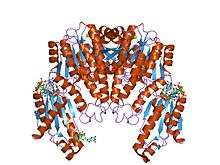GGDEF domain
| GGDEF domain | |||||||||
|---|---|---|---|---|---|---|---|---|---|
 response regulator pled in complex with c-digmp | |||||||||
| Identifiers | |||||||||
| Symbol | GGDEF | ||||||||
| Pfam | PF00990 | ||||||||
| Pfam clan | CL0276 | ||||||||
| InterPro | IPR000160 | ||||||||
| SCOP | 1w25 | ||||||||
| SUPERFAMILY | 1w25 | ||||||||
| CDD | cd01949 | ||||||||
| |||||||||
In molecular biology, the GGDEF domain is a protein domain which appears to be ubiquitous in bacteria and is often linked to a regulatory domain, such as a phosphorylation receiver or oxygen sensing domain. Its function is to act as a diguanylate cyclase and synthesize cyclic di-GMP, which is used as an intracellular signalling molecule in a wide variety of bacteria.[1][2] Enzymatic activity can be strongly influenced by the adjacent domains. Processes regulated by this domain include exopolysaccharide synthesis, biofilm formation, motility and cell differentiation.
Structural studies of PleD from Caulobacter crescentus show that this domain forms a five-stranded beta sheet surrounded by helices, similar to the catalytic core of adenylate cyclase.[3]
References
- ↑ Paul R, Weiser S, Amiot NC, Chan C, Schirmer T, Giese B, Jenal U (March 2004). "Cell cycle-dependent dynamic localization of a bacterial response regulator with a novel di-guanylate cyclase output domain". Genes Dev. 18 (6): 715–27. doi:10.1101/gad.289504. PMC 387245
 . PMID 15075296.
. PMID 15075296. - ↑ Ryjenkov DA, Tarutina M, Moskvin OV, Gomelsky M (March 2005). "Cyclic diguanylate is a ubiquitous signaling molecule in bacteria: insights into biochemistry of the GGDEF protein domain". J. Bacteriol. 187 (5): 1792–8. doi:10.1128/JB.187.5.1792-1798.2005. PMC 1064016
 . PMID 15716451.
. PMID 15716451. - ↑ Chan C, Paul R, Samoray D, Amiot NC, Giese B, Jenal U, Schirmer T (December 2004). "Structural basis of activity and allosteric control of diguanylate cyclase". Proc. Natl. Acad. Sci. U.S.A. 101 (49): 17084–9. doi:10.1073/pnas.0406134101. PMC 535365
 . PMID 15569936.
. PMID 15569936.
This article incorporates text from the public domain Pfam and InterPro IPR000160